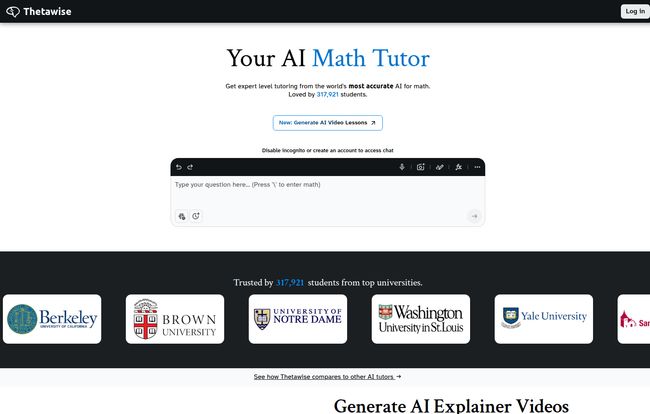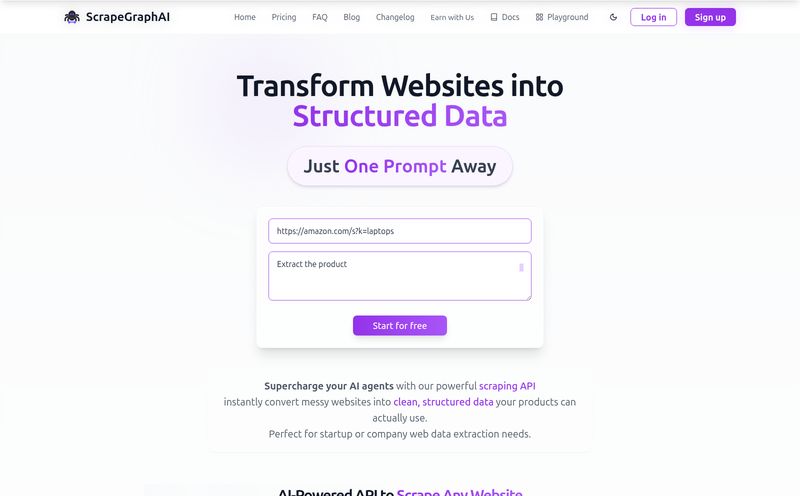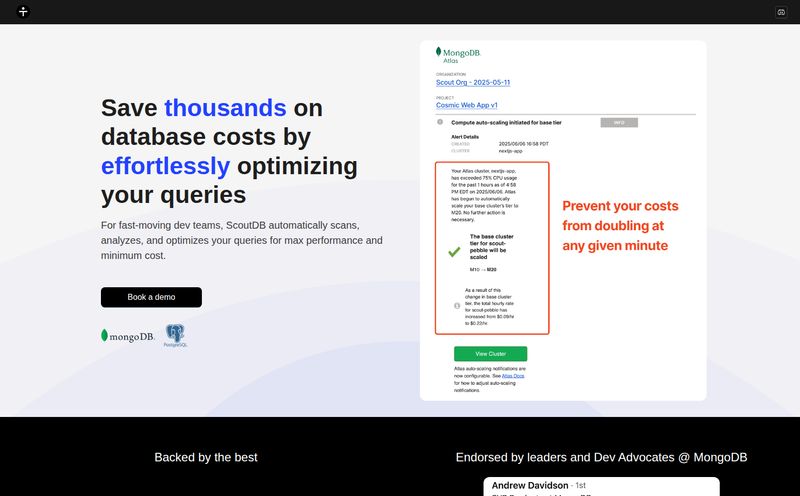We’ve all been there. It's 1 a.m., the coffee has stopped working, and you’re staring at a math problem that looks more like an ancient hieroglyph than something with an actual, logical answer. You’ve read the textbook chapter three times, watched a dozen YouTube videos, and you're no closer to that 'aha!' moment. It’s frustrating. It's the kind of academic wall that makes you question all your life choices.
For years, the promise of a digital tutor that could genuinely help has felt… well, just out of reach. Early tools were clunky. Some just gave you the answer, which is great for homework but terrible for, you know, actually learning. Then came the big AI models, which are amazing at writing sonnets but can sometimes stumble on a basic algebra question. It's been a journey.
But recently, I’ve been playing around with a tool that feels different. It's called Thetawise, and it’s positioning itself not just as a problem solver, but as a full-blown AI math tutor. And I have to say, I'm pretty intrigued. So, let's pull back the curtain and see if this thing is the real deal or just another flash in the pan.

Visit Thetawise
So What Is Thetawise, Really?
At its core, Thetawise is an AI-powered platform designed to help students tackle math problems. Simple enough. But where it starts to get interesting is in its approach. It's not just a calculator that spits out a final number. The entire platform is built around the idea of providing detailed, step-by-step solutions. The goal isn’t just to get you the 'what,' but to teach you the 'how' and the 'why'.
Think of it less like a cheat sheet and more like a patient tutor who’s available 24/7, never gets tired of your questions, and doesn’t judge you for asking how to factor a polynomial for the tenth time. It’s designed to handle a pretty impressive range of mathematics, from the stuff you see in high school algebra all the way up to upper-division college math. The testimonials on their site are from students at places like Berkeley and Yale, so it’s clearly aiming for a serious academic audience.
A Swiss Army Knife for Your Math Homework
One of the first things that jumped out at me about Thetawise is how you can feed it problems. They've clearly thought about how students actually work. It’s not just a boring text box. You have options, and this flexibility is a huge plus in my book.
The Many Ways to Ask for Help
You can type your question, which is standard. But you can also upload an image of your problem. Just snap a photo of your worksheet or textbook, and it gets to work. This is a lifesaver when you're dealing with complex fractions or gnarly integrals that would be a nightmare to type out manually. But the coolest input method, in my opinion, is the draw pad. You can literally handwrite the problem with your mouse or stylus, and its handwriting recognition is surprisingly good. For those of us who think better with a pen in our hand, this feels incredibly natural. Oh, and you can even speak your question. It's a bit of overkill for me, but hey, options are always good.
This multi-input approach shows a deep understanding of the user. It breaks down the barrier between your problem and getting help. No more fumbling with formatting symbols or trying to describe a complex graph in words; just show it what you're working on.
Going Beyond Just Finding 'X'
Getting the right answer is one thing. Understanding why it's the right answer is everything. This is where Thetawise tries to set itself apart. When it solves a problem, it doesn't just give you 'x = 5'. It lays out the entire process, step by step, with clear explanations for each transition. It's like showing your work, but for the student.
For Pro users, there’s an “Advanced Solver” that digs even deeper, tackling more complex, multi-step problems that might stump other AI tools. And it’s not just about solving. The platform includes practice sessions, allowing you to test your knowledge on similar types of problems. This is the feedback loop that’s so critical for learning. Solve a problem, learn the method, then practice it until it sticks. It's a solid pedagogical approach.
I also saw a new feature they're promoting: AI Explainer Videos. The idea of generating a custom video to walk you through your specific problem... that's pretty next-level stuff. If it works as advertised, it could be a game-changer for visual learners.
Let's Talk Numbers: Thetawise Pricing
Okay, let's get to the question everyone's asking: how much does it cost? The pricing structure is refreshingly straightforward.
| Plan | Cost | Key Features |
|---|---|---|
| Free | $0 / month | 50 free messages per day. Access to image uploads, draw pad, and speech-to-text. |
| Pro | $15/mo (billed annually) or $20/mo (billed monthly) | Unlimited questions, Advanced Solver access, PDF uploads, plus everything in the Free plan. |
My take? The Free plan is incredibly generous. 50 messages a day is more than enough for the average student trying to get through their daily homework. You get access to all the cool input methods, which is fantastic. The Pro plan is clearly aimed at the dedicated STEM major or someone taking multiple heavy-duty math or physics courses. If you're constantly living in the world of differential equations or linear algebra, the unlimited questions and Advanced Solver would likely be worth the investment, especially if you opt for the annual billing.
The Good, The Bad, and The Algebraic
No tool is perfect. As an SEO and tech blogger, I've seen my fair share of platforms that promise the world and deliver a small village. So, let’s get into a bit of an honest pro/con breakdown.
On the plus side, the accuracy and detail of the step-by-step solutions are a huge win. The user testimonials seem to back this up, with people praising the explanations. The multiple input methods are, as I mentioned, a standout feature. It's genuinely useful and not just a gimmick. The ability to handle a wide spectrum of math, from basic to advanced, also makes it a versatile tool for a student's entire academic path.
Now, for the not-so-great. The company is upfront that the AI can still make occasional algebraic errors. This is an important admission. It’s a powerful tool, not an infallible oracle. You should still use it to learn the process and double-check the work, not just blindly copy the answer. Think of it as a collaborator, not a replacement for your own brain. The other major drawback for me, and it's a big one in 2024, is the lack of a dedicated mobile app. Students live on their phones. Being able to quickly snap a picture of a problem in the library or on the bus is a huge use case. While the website is likely mobile-friendly, a native app experience is almost always smoother. This feels like a miss, but hopefully one they'll fix soon.
My Verdict: Is Thetawise Worth Your Time?
So, after kicking the tires, what’s the final word? I think Thetawise is a genuinely powerful and well-designed tool for its target audience. It's a massive step up from just Googling a question or plugging it into a generic AI chatbot.
If you’re a high school or college student who frequently gets stuck on math problems and needs more than just an answer, Thetawise is absolutely worth a try. The free plan is more than enough to see if it works for you. For the price of zero dollars, you get a tutor that can read your handwriting and walk you through complex problems. That’s a pretty good deal.
It's not perfect. You still need to be an active participant in your own learning, and the lack of a mobile app is a definite bummer. But as a supplemental learning aid—a sidekick for those late-night study sessions—it’s one of the most promising AI math tools I’ve seen in a while. It strikes a great balance between providing immediate help and actually fostering understanding. And in the long run, that understanding is what really counts.
Frequently Asked Questions
- Is Thetawise actually accurate?
- For the most part, yes. It's designed to provide accurate step-by-step solutions for a wide range of math. However, like any AI tool, it can occasionally make small errors. It's best used as a learning guide to understand the process rather than a tool for getting answers without checking them.
- Can Thetawise help with advanced subjects like calculus?
- Absolutely. Thetawise is built to handle everything from basic algebra to upper-division college math, which includes subjects like calculus, linear algebra, and differential equations. The Pro plan's Advanced Solver is specifically geared toward these more complex topics.
- Is there a Thetawise mobile app?
- Currently, no. There isn't a dedicated mobile app for iOS or Android. You can access the tool through the web browser on your phone, but it’s a notable missing feature.
- What are the limitations of the free plan?
- The main limitation is the cap of 50 free messages (questions) per day. This is quite generous for daily homework, but students needing more extensive help for exam prep might hit the limit. The free plan does not include access to the Advanced Solver or PDF uploads.
- How is Thetawise different from just using ChatGPT for math?
- While large language models like ChatGPT can attempt math, they are general-purpose tools and can be unreliable with complex calculations. Thetawise is a specialized tool trained specifically on mathematics. It’s built to provide structured, step-by-step pedagogical explanations and offers specialized features like the draw pad and graphing capabilities that you won't find in a standard chatbot.
Conclusion
Navigating the world of math can be tough, but the tools we have at our disposal are getting seriously impressive. Thetawise stands out as a thoughtful, powerful, and genuinely useful AI tutor. It respects the learning process by focusing on the 'how' and 'why,' not just the final answer. While it has a couple of areas for improvement (I'm looking at you, mobile app!), its generous free plan and robust features make it a must-try for any student looking for a little extra help. Give it a shot; your GPA might thank you.



